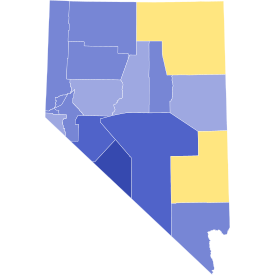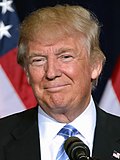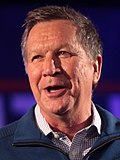| |||||||||||||||||||||||||||||||||||||||||||||||
| ← SCAK → | |||||||||||||||||||||||||||||||||||||||||||||||
30 pledged delegates to the Republican National Convention | |||||||||||||||||||||||||||||||||||||||||||||||
|---|---|---|---|---|---|---|---|---|---|---|---|---|---|---|---|---|---|---|---|---|---|---|---|---|---|---|---|---|---|---|---|---|---|---|---|---|---|---|---|---|---|---|---|---|---|---|---|
| |||||||||||||||||||||||||||||||||||||||||||||||
 Election results by county
Election results by county  Election results by congressional district
Election results by congressional district
| |||||||||||||||||||||||||||||||||||||||||||||||
The 2016 Nevada Republican presidential caucuses took place on February 23 in the U.S. state of Nevada, marking the Republican Party's fourth nominating contest in their series of presidential primaries ahead of the 2016 presidential election.
With the Democratic Party having already held its Nevada caucuses three days earlier on February 20, the Republican caucus in Nevada was the only presidential primary on that day.
During the 2015 legislative session, lawmakers attempted to change the caucus into a regular primary and at a much earlier date, however the bill failed to advance to a vote.
Candidates
Nine candidates were eligible:
- Jeb Bush (dropped out)
- Ben Carson
- Chris Christie (dropped out)
- Ted Cruz
- Carly Fiorina (dropped out)
- Jim Gilmore (dropped out)
- John Kasich
- Marco Rubio
- Donald Trump
Debates and forums
See also: 2016 Republican Party presidential debates and forumsDecember 15, 2015 – Las Vegas, Nevada
The fifth debate was held on December 15, 2015, at the Venetian Resort in Las Vegas, Nevada. It was the second debate to air on CNN, and was also broadcast by Salem Radio. The debate was moderated solely by Wolf Blitzer with Dana Bash and Hugh Hewitt serving alongside as questioners.
The debate was split into primetime and pre-primetime groups based on averaged polling numbers; in order to participate in the main debate, candidates had to meet one of three criteria in polls conducted between October 29 and December 13 which were recognized by CNN—either an average of at least 3.5% nationally, or at least 4% in either Iowa or New Hampshire. The secondary debate featured candidates that had reached at least 1% in four separate national, Iowa, or New Hampshire polls that are recognized by CNN. Paul was included in the main debate after not qualifying under the original rules because he received 5% support in Iowa in a Fox News poll.
The debate lineup was announced on December 13 to include Trump, Cruz, Rubio, Carson, Bush, Fiorina, Christie, Paul, and Kasich in the primetime debate, and Huckabee, Santorum, Graham, and Pataki in the undercard debate. Commentators suggested that the key confrontation would be between Trump and Cruz, based on their respective polling in Iowa.
Eighteen million people watched the debate, making it the third-largest audience ever for a presidential primary debate. During the debate, the audible coughing was attributed to Ben Carson. His campaign admitted that they all got sick a month prior and Carson had kept the cough for weeks. The cough was "almost gone" and Carson was not really sick at the time.
The undercard debate was the fourth and final debate appearance of Senator Lindsey Graham and former Governor George Pataki, who suspended their campaigns on December 21 and December 29, respectively.
Endorsements
See also: Endorsements in the 2016 Republican Party presidential primariesHaving been swept into numerous offices in the previous election, many new Nevada Republican officeholders came out in support of various candidates. Notably, there were splits among different groups of Republicans towards their endorsements. Legislators who had supported a controversial tax hike during the 2015 session came out in support of Jeb Bush and Marco Rubio, while those who opposed it supported Rand Paul, Ted Cruz or Donald Trump.
(Note: This list contains endorsements only for candidates who were still running at the time of the caucuses)
Ted Cruz- Statewide officials
- Attorney General Adam Laxalt
State legislators
- Assemblywoman Michelle Fiore
- Assemblywoman Victoria Seaman
- Assemblyman Ira Hansen
- Assemblyman John Moore (also supported Rand Paul)
- Assemblyman Jim Wheeler
- Assemblywoman Vicki Dooling
- Statewide officials
- State Controller Ron Knecht
State legislators
- Assemblyman John Hambrick (Speaker) (previously endorsed Jeb Bush)
- Assemblywoman Vicki Dooling
Local officials
- Las Vegas City Councilman Bob Beers
- Statewide officials
- Lieutenant Governor Mark Hutchison
- Former Governor Robert List
- Former Lieutenant Governor Lorraine Hunt-Bono
U.S. Senators
- U.S. Senator Dean Heller
U.S. Representatives
- Congressman Mark Amodei
- Congressman Cresent Hardy
State legislators
- State Senator Michael Roberson (Majority Leader)
- State Senator Joe Hardy (President Pro Tempore)
- State Senator Patricia Farley
- State Senator Becky Harris
- State Senator Scott Hammond
- State Senator Ben Kieckhefer
- Assemblyman Paul Anderson (Majority Leader) (previously endorsed Jeb Bush)
- Assemblyman Stephen Silberkraus
- Assemblyman Lynn Stewart
- Assemblyman Derek Armstrong
- Assemblyman Randy Kirner
- Assemblyman David Gardner (previously endorsed Jeb Bush)
- Assemblyman Glenn Trowbridge
- Assemblyman Pat Hickey
- Assemblyman Erv Nelson
Local officials
- Former Clark County Commissioner Bruce Woodbury
- Former North Las Vegas Mayor Shari Buck
- State legislators
- Assemblyman Brent Jones
Polling
See also: Statewide opinion polling for the Republican Party presidential primaries, 2016Aggregate polls
| Source of poll
aggregation |
Dates
administered |
Dates
updated |
Marco Rubio Republican |
Donald Trump Republican |
Ted Cruz Republican |
Margin |
|---|---|---|---|---|---|---|
| FiveThirtyEight | until February 23, 2016 | February 23, 2016 | 27.1% | 37.1% | 21.0% | Trump +10.0 |
| Poll source | Date | 1st | 2nd | 3rd | Other |
|---|---|---|---|---|---|
| Primary results | February 23, 2016 | Donald Trump45.75% | Marco Rubio23.77% | Ted Cruz21.30% | Ben Carson 4.79%, John Kasich 3.59% |
| CNN/ORC
Margin of error: ± 6.5% Sample size: 245 |
February 10–15, 2016 | Donald Trump 45% |
Marco Rubio
19% |
Ted Cruz
17% |
Ben Carson 7%, John Kasich 5%, Jeb Bush 1%, Someone else 2%, No opinion 4% |
| Gravis Marketing
Margin of error: ± 5% Sample size: 406 |
December 23–27, 2015 | Donald Trump 33% |
Ted Cruz
20% |
Marco Rubio
11% |
Ben Carson 6%, Carly Fiorina 5%, Jeb Bush 5%, Chris Christie 5%, Rand Paul 1%, Rick Santorum 1%, John Kasich 0%, Mike Huckabee 0%, Unsure 12% |
| Morning Consult
Margin of error: ± 4% Sample size: 249 |
November 10–16, 2015 | Donald Trump 38% |
Ben Carson
18% |
Marco Rubio
12% |
Ted Cruz 7%, Jeb Bush 6%, Carly Fiorina 2%, Mike Huckabee 2%, Rand Paul 2%, Chris Christie 1%, John Kasich 1%, Lindsey Graham 1%, Rick Santorum 0%, Someone else 1%, Don't know/No opinion 8% |
| CNN/ORC
Margin of error: ± 6% Sample size: 285 |
October 3–10, 2015 | Donald Trump 38% |
Ben Carson
22% |
Carly Fiorina
8% |
Marco Rubio 7%, Jeb Bush 6%, Ted Cruz 4%, Mike Huckabee 4%, Rand Paul 2%, Jim Gilmore 1%, Chris Christie 1%, George Pataki 1%, John Kasich 1%, Lindsey Graham 0%, Bobby Jindal 0%, Rick Santorum 0%, None 3%, No opinion 3% |
| Gravis Marketing
Margin of error: ± 4% Sample size: 623 |
July 12–13, 2015 | Donald Trump 28% |
Scott Walker
15% |
Ben Carson
8% |
Jeb Bush 7%, Marco Rubio 5%, Rand Paul 4%, Ted Cruz 4%, Rick Perry 3%, Bobby Jindal 2%, Mike Huckabee 2%, Chris Christie 2%, George Pataki 1%, Carly Fiorina 0%, Lindsey Graham 0%, Rick Santorum 0%, Undecided 20% |
| Gravis Marketing
Margin of error: ± 5% Sample size: 443 |
March 27, 2015 | Ted Cruz 18% |
Scott Walker 18% |
Jeb Bush 16% |
Marco Rubio 7%, Ben Carson 6%, Rand Paul 5%, Chris Christie 4%, Mike Huckabee 4%, Rick Santorum 2%, Carly Fiorina 1%, Undecided 20% |
| Gravis Marketing
Margin of error: ± 5% Sample size: 438 |
February 21–22, 2015 | Scott Walker 27% |
Jeb Bush
19% |
Chris Christie
8% |
Ted Cruz 6%, Mike Huckabee 6%, Rick Perry 6%, Marco Rubio 4%, Rick Santorum 4%, Rand Paul 3%, Bobby Jindal 1%, Undecided 16% |
Results
Primary date: February 23, 2016
County conventions: March 12 - April 2, 2016 (presumably)
State convention: May 7–8, 2016 (presumably)
National delegates: 30
| Candidate | Votes | Percentage | Actual delegate count | ||
|---|---|---|---|---|---|
| Bound | Unbound | Total | |||
| Donald Trump | 34,531 | 45.75% | 14 | 0 | 14 |
| Marco Rubio | 17,940 | 23.77% | 7 | 0 | 7 |
| Ted Cruz | 16,079 | 21.30% | 6 | 0 | 6 |
| Ben Carson | 3,619 | 4.79% | 2 | 0 | 2 |
| John Kasich | 2,709 | 3.59% | 1 | 0 | 1 |
| Invalid | 266 | 0.35% | 0 | 0 | 0 |
| Rand Paul (withdrawn) | 170 | 0.23% | 0 | 0 | 0 |
| Jeb Bush (withdrawn) | 64 | 0.08% | 0 | 0 | 0 |
| Chris Christie (withdrawn) | 50 | 0.07% | 0 | 0 | 0 |
| Carly Fiorina (withdrawn) | 22 | 0.03% | 0 | 0 | 0 |
| Mike Huckabee (withdrawn) | 21 | 0.03% | 0 | 0 | 0 |
| Rick Santorum (withdrawn) | 11 | 0.01% | 0 | 0 | 0 |
| Jim Gilmore (withdrawn) | 0 | 0 | 0 | ||
| Unprojected delegates: | 0 | 0 | 0 | ||
| Total: | 75,482 | 100.00% | 30 | 0 | 30 |
| Source: The Green Papers | |||||
Delegates were awarded to candidates who got more than 3.33% of the vote proportionally.
Donald Trump received more votes than the combined total of the 2012 Nevada caucuses, while also beating Mitt Romney's previous two records. On the eve of the caucuses, Trump stopped by Palo Verde High School in Summerlin to greet voters.
Results by county
| County | Cruz | Rubio | Trump |
|---|---|---|---|
| Carson City | 18.8% | 24.4% | 43.4% |
| Churchill | 23.13% | 25.35% | 39.88% |
| Clark | 19.10% | 24.58% | 48.93% |
| Douglas | 25.88% | 27.09% | 36.44% |
| Elko | 43.84% | 21.22% | 25.32% |
| Esmeralda | 12.16% | 10.81% | 62.16% |
| Eureka | 34.36% | 15.90% | 41.54% |
| Humboldt | 21.90% | 21.09% | 41.83% |
| Lander | 35.66% | 17.35% | 39.76% |
| Lincoln | 44.56% | 16.14% | 28.77% |
| Lyon | 24.52% | 17.45% | 48.24% |
| Mineral | 19.37% | 19.90% | 50.79% |
| Nye | 23.52% | 12.68% | 56.48% |
| Pershing | 28.28% | 19.66% | 40.69% |
| Storey | 21.07% | 15.20% | 42.93% |
| Washoe | 20.87% | 24.58% | 44.13% |
| White Pine | 26.90% | 22.53% | 39.54% |
| TOTAL | 21.38% | 23.85% | 45.91% |
| Source: https://uselectionatlas.org/RESULTS/state.php?fips=32&year=2016&f=0&off=0&elect=2 | |||
Analysis
Donald Trump overwhelmingly won the caucuses, with Marco Rubio, who for a time lived in Nevada, coming in a distant second. According to exit polls by Edison Research, Trump won among ideologically moderate (50%) and somewhat conservative (55%) voters. Trump carried white caucus-goers with 47% and Latino caucus-goers with 45%.
Ted Cruz won two counties, Elko and Nye, the latter of which has a large LDS population. Mormon voters continued to be a strong constituency for Cruz throughout the primary.
References
- "AB302". www.leg.state.nv.us. Retrieved April 23, 2016.
- "Nevada plan to dump presidential caucus falls short". Politico. Retrieved April 23, 2016.
- WRAL: NC approves 27 candidates for presidential primary ballots
- NC State Board of Elections presidential primary candidates' list (preliminary)
- "2016 Presidential Debates Fast Facts". CNN. August 20, 2015. Retrieved September 13, 2015.
- ^ Scott, Eugene (December 14, 2015). "Stage set for final GOP debate of 2015". CNN. Retrieved December 15, 2015.
- ^ "CNN Republican presidential debate criteria announced". CNN. November 20, 2015. Retrieved November 20, 2015.
- "How Rand Paul barely made it into Tuesday's main debate". www.cbsnews.com. Retrieved January 2, 2016.
- Sahil Kapur; Michael C Bender; Kevin Cirilli (December 15, 2015). "How the Fifth Republican Debate Could Reshape the Race". Bloomberg.com/politics.
- "18 million watched Republican debate". USA TODAY. Retrieved December 17, 2015.
- "The Cough That Consumed the GOP Debate". ABC News. December 16, 2015. Retrieved December 17, 2015.
- "First on CNN: Graham ends his campaign for the White House". CNN. December 21, 2015.
- "Former ny gov. george pataki says he's planning to drop white house bid". abc13. December 29, 2015. Archived from the original on January 4, 2016. Retrieved December 29, 2015.
- FiveThirtyEight
- Primary results
- "CNN/ORC Poll" (PDF). ORC International. Retrieved February 17, 2016.
- Gravis Marketing
- Morning Consult
- "CNN/ORC Poll". ORC International. Retrieved February 17, 2016.
- Gravis Marketing
- Gravis Marketing
- Gravis Marketing
- "Trump Has Won More Votes Than Romney Had At This Point in 2012". Weekly Standard. February 24, 2016. Archived from the original on February 25, 2016. Retrieved April 22, 2016.
- Segal, Cheryl. "Trump takes caucus site by surprise". The Hill. Retrieved April 22, 2016.
- ^ "2016 Election Center". CNN. Retrieved June 18, 2022.
- "Donald Trump apparently won the Latino vote in Nevada. It doesn't mean Latinos suddenly love him". The Washington Post. ISSN 0190-8286. Retrieved June 18, 2022.
- "LDS Enclaves". American Communities Project. Retrieved June 18, 2022.
| 2016 Republican Party presidential primaries | |
|---|---|
| February | |
| Super Tuesday | |
| March | |
| April | |
| May | |
| June | |





